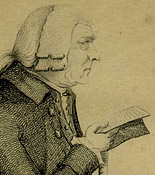Ham
Bryant, Jacob *
 Jacob Bryant (1715-1804) was an English antiquarian and mythologist, who completely denied that the Homeric account of the Trojan War had any historical value.(b) This infuriated the Romantic poet Lord George Byron, who denounced Bryant as a ‘blackguard’. All this took place decades before Schliemann began excavating at Hissarlik.
Jacob Bryant (1715-1804) was an English antiquarian and mythologist, who completely denied that the Homeric account of the Trojan War had any historical value.(b) This infuriated the Romantic poet Lord George Byron, who denounced Bryant as a ‘blackguard’. All this took place decades before Schliemann began excavating at Hissarlik.
Eberhard Zangger invoked [483.115] the work of Bryant to support his identification of Troy as Atlantis where Bryant refers to Dardanus as the founder of Ilium or Troy and declares the Dardanians to be Atlantians.
Although Bryant denied the reality of Troy, he was content to declare that the ‘Atlantians’ were descended from Ham, one of Noah’s sons and that they settled in Phrygia (part of modern Turkey) and Mauritania (North-West Africa). These comments can be found in one of his best known works, New System Or an Analysis of Ancient Mythology (1774 ed. Vol.1 p.387), which can now be read online[1033].(a)
(a) https://archive.org/details/analysisancientmyth01brya *
(b) Jacob Bryant – Wikipedia *
Athene *
Athene is the goddess that gave her name to the Greek capital. Interestingly the pre-Hellenic people of Greece, the Pelasgians, believed that the goddess Athene or Athena was born beside Lake Tritonis in Libya. The North Africans had a legendary queen called Tin Hanan that Dr. Chaouat identified with Athene [(A)tin-ha(nan)]. De Prorok claimed to have found her tomb.
Furthermore, the Egyptian city of Sais where Solon first learned of Atlantis had it principal temple dedicated to the goddess Neith whom the Egyptian priests identified with Athene.
Both are similarly represented, Neith with a bow and arrow, Athene with a shield and spear. Neith is also associated with the Libyan goddess Tanit.
Some commentators have sought to link Athene with the Egyptian god Aten, while one website(a)(b)(e) has claimed that Athene was the biblical Eve. The latter idea is also expressed on the Answers in Genesis website(c).
Robert Bowie Johnson jr the American author of a number of books on Greek Mythology has traced the origins of Athena back to antediluvian times when she was known as Naamah the wife of Ham(d). Unfortunately, there is more than one Naamah mentioned in the Bible, which has led to some confusion among scholars.
(a) https://creation.com/athena-and-eve
(b) How Obvious is it that Athena (archive.org)
(c) Archive 2500
